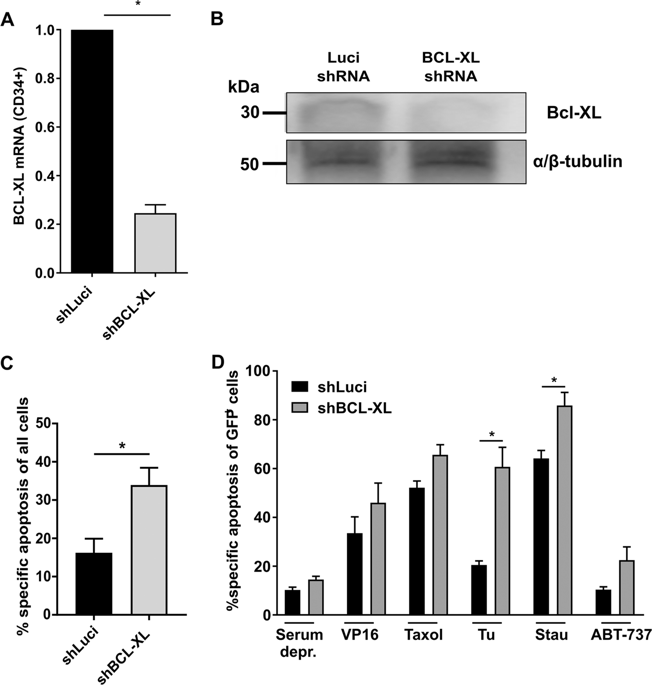Cell Death & Disease ( IF 9 ) Pub Date : 2020-01-06 , DOI: 10.1038/s41419-019-2203-z Sehar Afreen 1, 2 , Sheila Bohler 1, 2 , Alexandra Müller 1 , Eva-Maria Demmerath 1 , Julia Miriam Weiss 1 , Jonas Samuel Jutzi 3 , Kristina Schachtrup 4 , Mirjam Kunze 5 , Miriam Erlacher 1, 6

|
The anti-apoptotic BCL-2 proteins (BCL-2, BCL-XL, MCL-1, A1, BCL-W) counteract apoptotic signals emerging during development and under stress conditions, and are thus essential for the survival of every cell. While the “BCL-2 addiction” of different cell types is well described in mouse models, there is only limited information available on the role of different anti-apoptotic BCL-2 proteins in a given human cell type. Here we characterize the role of BCL-XL for survival and function of human hematopoietic cells, with the aim to predict hematological side effects of novel BCL-XL-inhibiting BH3-mimetics and to identify hematological malignancies potentially responsive to such inhibitors. Earlier clinical studies have shown that the combined BCL-2/BCL-XL/BCL-W inhibitor, Navitoclax (ABT-263) induces severe thrombocytopenia caused by direct platelet demise and counteracted by increased megakaryopoiesis. In contrast, murine studies have reported important contribution of BCL-XL to survival of late erythroid cells and megakaryocytes. Using lentiviral knockdown, we show that the roles of BCL-XL for human hematopoietic cells are much more pronounced than expected from murine data and clinical trials. Efficient genetic or chemical BCL-XL inhibition resulted in significant loss of human erythroid cells beginning from very early stages of erythropoiesis, and in a reduction of megakaryocytes. Most importantly, BCL-XL deficient human hematopoietic stem cells and multipotent progenitors were reduced in numbers, and they showed a severely impaired capacity to engraft in mice during xenotransplantation. BCL-XL deficiency was fully compensated by BCL-2 overexpression, however, loss of its antagonist BIM did not result in any rescue of human erythroid or stem and progenitor cells. We thus conclude that novel and specific BCL-XL inhibitors might be efficient to treat malignancies of erythroid or megakaryocytic origin, such as polycythemia vera, acute erythroid leukemia, essential thrombocytosis or acute megakaryocytic leukemia. At the same time, it can be expected that they will have more severe hematological side effects than Navitoclax.
中文翻译:

BCL-XL表达对于人类红细胞生成和造血干细胞的植入至关重要。
抗凋亡的BCL-2蛋白(BCL-2,BCL-XL,MCL-1,A1,BCL-W)可抵消发育过程中和在压力条件下出现的凋亡信号,因此对于每个细胞的生存都是必不可少的。尽管在小鼠模型中很好地描述了不同细胞类型的“ BCL-2上瘾”,但在给定的人类细胞类型中,不同抗凋亡BCL-2蛋白的作用只有有限的信息。在这里,我们表征了BCL-XL在人类造血细胞存活和功能中的作用,旨在预测新型BCL-XL抑制性BH3模拟物的血液学副作用,并确定可能对此类抑制剂产生反应的血液系统恶性肿瘤。早期的临床研究表明,联合使用的BCL-2 / BCL-XL / BCL-W抑制剂,Navitoclax(ABT-263)引起严重的血小板减少症,其原因是直接的血小板死亡和增加的巨核细胞生成所抵消。相反,鼠类研究报道了BCL-XL对晚期红系细胞和巨核细胞存活的重要贡献。使用慢病毒敲低,我们表明BCL-XL在人类造血细胞中的作用比从鼠类数据和临床试验预期的要明显得多。有效的遗传或化学BCL-XL抑制作用导致从红细胞生成的非常早期开始就大量丢失人类红系细胞,并导致巨核细胞减少。最重要的是,缺乏BCL-XL的人类造血干细胞和多能祖细胞数量减少,并且它们在异种移植过程中的小鼠移植能力严重受损。BCL-XL缺乏症可以通过BCL-2的过表达完全补偿,但是,其拮抗剂BIM的丧失并不能挽救任何人类红系或干细胞和祖细胞。因此,我们得出的结论是,新的特异性BCL-XL抑制剂可能有效治疗类红细胞或巨核细胞源性恶性肿瘤,例如真性红细胞增多症,急性类红细胞白血病,原发性血小板增多症或急性巨核细胞白血病。同时,可以预料它们将比Navitoclax具有更严重的血液学副作用。例如真性红细胞增多症,急性红系白血病,原发性血小板增多症或急性巨核细胞白血病。同时,可以预料它们将比Navitoclax具有更严重的血液学副作用。例如真性红细胞增多症,急性红系白血病,原发性血小板增多症或急性巨核细胞白血病。同时,可以预料它们将比Navitoclax具有更严重的血液学副作用。



























 京公网安备 11010802027423号
京公网安备 11010802027423号